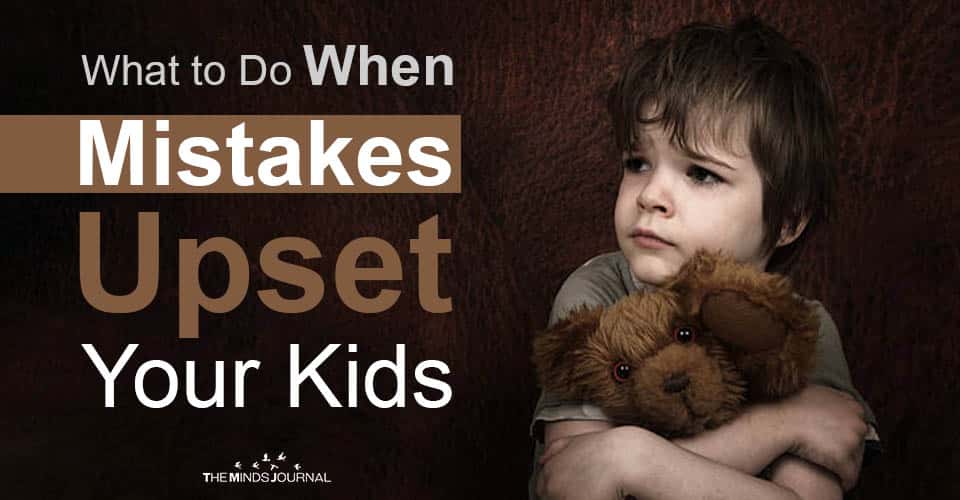When mistakes upset your kids- Whatever happened to their endless curiosity that overcame the fear and frustration of mistakes?
From infancy, young brains need to make sense of their world in order to survive. Innate curiosity is critical to promote this exploration and it unconsciously drives behavior. Through exploration, children gradually construct neural networks of categories (patterns, schema). Through more exploration and experience these networks expand to accommodate greater detail. These networks fine-tune in response to mistakes (incorrect predictions based on existing information) as they make more accurate connections between what is experienced (sensory input) compared to what was predicted. This continues without conscious awareness.
Mistakes are frustrating
All too soon after young children start working to build skills they desire, from early puzzles to scribbles they want to look like circles, they experience the frustration of not doing it “right.” Even when we assure them that there is no right or wrong when starting out or that with practice they’ll get better and better, many still suffer this distress.
Going from the unknown to the known involves detours through uncertainty and mistakes. For most children in school, their greatest fear is making a mistake in front of the whole class. Help them understand that setbacks provide opportunities for them to revise their brains’ inaccurate memory circuits that, uncorrected, could severely impede future understandings. Allowing children to make mistakes while building understanding solidifies accurate learning connections. Working through periods of confusion strengthens the correct durable networks their brains ultimately construct.
Mistakes are powerful learning and growing tools
Just as learning how to walk, speak, and read does not emerge fully proficient, the development of tolerance to setbacks is not a smooth pathway to perfection. When you increase their comfort making mistakes, you’ll build their willingness to think out of the box and interpret information with wider perspectives. Help your children recognize they’ll build confidence, problem-solving perseverance, and creativity by understanding that mistakes can be brain boosters.
Want to know more about how you can help when mistakes upset your kids? Read 5 Practical Things You Can Do For Building Your Child’s Self-Confidence
Help Children Learn Tolerate Ambiguity, Uncertainty, and The Risk Of Making Mistakes
It is said that “If we don’t allow children to fail at times, we are setting them up for overwhelming distress from failure in the real world”. When you encourage thinking beyond single approaches and allow your children opportunities to make decisions, choices, and confront the mistakes that come with these transitions from the unknown, you give them the gift of flexible and creative thinking.
How does one decrease the fear of making mistakes
1. Acknowledge your own mistakes.
2. Share motivating memories.
3. Provide examples of people they admire who described their struggles with mistakes.
4. Acknowledge your own mistakes.
When you make a mistake, acknowledge it to your children. Tell them about times when you were their age and felt very embarrassed or angry about your mistakes. Perhaps at times, your first instinct was to blame someone else or to try to hide your mistakes. Let them know if it was a struggle for you to acknowledge your mistakes and frustrating to expend more time to really understand something that was hard.
Encourage them to tell you about the mistakes they have made in the past and how they felt and reacted. Ask them what they would do differently now confronting similar issues.
Motivating memories
Remind children of struggles they had with mistakes they made when the ultimate outcome was a success at the skill or understanding. “Remember when you were learning to play soccer and you kept trying even though you felt like giving up?” Remember when you struggled to play basic chords on the guitar and now you have mastered so many?” Remember your first attempts to write and now it’s easy for you? Help them recall that with effort and practice, they made fewer mistakes and enjoyed the pleasure of greater skill.
Looking to know more about how you can support your kids? Read 20 Growth Mindset Ted Talks For Kids
Role Models of People Who Made Mistakes
Discuss quotes about mistakes from people they respect. Many can be found online.
Thomas Edison, “I have not failed. I’ve just found 10,000 ways that won’t work.”
Wayne Gretzky, “You miss 100% of the shots you don’t take.”
Michael Jordan, “I’ve missed more than 9,000 shots in my career. I’ve lost almost 300 games. 26 times, I’ve been trusted to take the game-winning shot and missed. I’ve failed over and over and over again in my life. And that is why I succeed.”
…………………..
As your children build mistake tolerance and tenacity through setbacks, they will recognize mistakes as opportunities that increase understanding or skills rather than indications of failure. You’ll see them build increased determination solving problems and greater acceptance to corrective feedback and revisions.
These habits of mind will enhance their school experiences now, and boost their lifelong willingness to persevere while developing new skills and turning the unknowns into understandings.
Written By Judy Willis
Originally Appeared In Psychology Today
Children are way more sensitive than grown-ups, and naturally do not have the maturity to understand many things. As a parent, you should try to make them realize that it’s okay to make mistakes and that it’s not the end of the world. Help them understand that everyone slips at some point, and what matters is moving on from it.
If you want to know more about what you can do when mistakes upset your kids, then check this video out below:










Leave a Reply